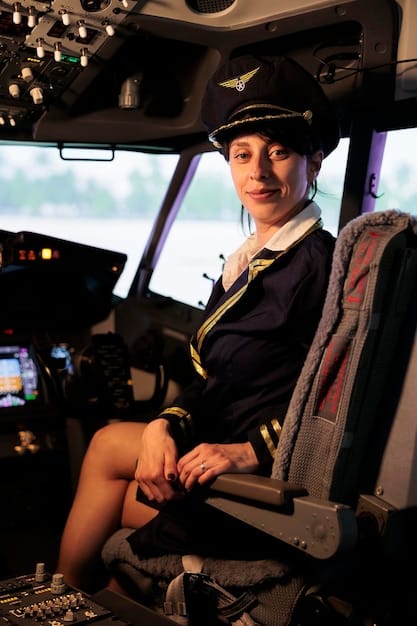FAA Pilot Certification 2025: New Requirements & Expert Guide

FAA Announces New Pilot Certification Requirements for 2025: What You Need to Know delves into the upcoming changes in pilot certification by the FAA in 2025, outlining the impact on aspiring and current pilots and offering guidance through the updated standards and procedures.
The FAA (Federal Aviation Administration) has announced significant changes to pilot certification requirements slated to take effect in 2025. These updates will impact aspiring pilots, current certified aviators, and flight schools across the United States. In this comprehensive guide, we’ll break down the FAA Announces New Pilot Certification Requirements for 2025: What You Need to Know, helping you understand the changes, prepare for them, and ensure a smooth transition.
Understanding the FAA’s Rationale for Updated Pilot Certification
The Federal Aviation Administration continuously evaluates and refines its pilot certification processes to enhance safety, improve training standards, and address emerging challenges in aviation. The upcoming changes in 2025 are a result of thorough assessments and aim to ensure pilots are well-equipped to handle modern aircraft and complex operational environments.
Enhancing Aviation Safety Through Rigorous Training
A key driver behind the updated certification requirements is to bolster aviation safety. By incorporating more comprehensive training modules, the FAA aims to reduce the likelihood of human error, which remains a significant factor in aviation accidents. The new standards emphasize practical skill development and decision-making in challenging scenarios.
Adapting to Technological Advancements in Aviation
Modern aircraft are increasingly equipped with advanced technology, requiring pilots to possess a deeper understanding of automation, electronic flight displays, and navigation systems. The updated certification process will include expanded training on these technologies, ensuring pilots are proficient in their use and capable of managing them effectively.
- Advanced avionics training
- Emphasis on automation management
- Integration of scenario-based training
- Focus on emerging aviation technologies

The FAA’s commitment to continuous improvement is evident in these changes, reflecting a proactive approach to addressing the evolving landscape of aviation. By staying ahead of technological advancements and focusing on skill enhancement, the updated pilot certification requirements aim to cultivate a safer and more proficient pilot community.
Key Changes to Pilot Certification Requirements in 2025
The new pilot certification requirements encompass several key changes, affecting various aspects of pilot training and evaluation. These modifications are designed to enhance the overall quality of pilot education and ensure that certified aviators meet the highest standards of competency.
Increased Minimum Flight Hours for Certain Ratings
One of the most significant changes involves increasing the minimum flight hours required for certain pilot ratings, particularly the Airline Transport Pilot (ATP) certificate. The FAA aims to provide aspiring ATP pilots with more extensive practical experience before they assume the responsibilities of flying for commercial airlines.
Revised Written Exam Content and Structure
The FAA plans to revise the content and structure of written exams for various pilot certificates and ratings. The updated exams will include a greater emphasis on critical thinking, problem-solving, and the application of aviation regulations to real-world scenarios. This shift reflects the FAA’s commitment to assessing pilots’ understanding of aviation principles beyond rote memorization.
Expanded Practical Flight Exam Scenarios
Practical flight exams will also undergo revisions, with the introduction of more complex and realistic scenarios. Examiners will assess pilots’ ability to handle abnormal situations, make sound decisions under pressure, and demonstrate effective communication and crew resource management skills.
- Scenario-based flight training
- Emphasis on decision-making skills
- Advanced emergency procedure training
- Integration of risk management principles
These key changes represent a comprehensive effort to enhance the effectiveness and relevance of pilot certification. By increasing flight hour requirements, revising written exam content, and expanding practical flight exam scenarios, the FAA aims to ensure that certified pilots are well-prepared to operate safely and efficiently in today’s aviation environment.
Impact on Aspiring Pilots and Flight Schools
The announced changes to pilot certification requirements will have a notable impact on aspiring pilots and flight schools alike. Understanding these effects is crucial for making informed decisions about flight training and career planning.
Increased Costs and Time Commitment for Training
The increase in minimum flight hours and the expanded scope of training modules will likely lead to higher costs and a longer time commitment for aspiring pilots. Flight schools may need to adjust their curricula and pricing structures to accommodate the new requirements.
Demand for Qualified Flight Instructors
As flight schools adapt to the updated certification standards, there will be an increased demand for qualified flight instructors who possess in-depth knowledge of the new requirements and the ability to effectively impart that knowledge to students. Flight instructors will play a vital role in preparing aspiring pilots for the revised written and practical exams.
Potential Delays in Pilot Certification
The implementation of the new requirements may lead to temporary delays in pilot certification as flight schools and the FAA adjust to the changes. Aspiring pilots should factor in potential delays when planning their training timelines and career goals.

- Rising training expenses
- Increased time commitment
- Greater demand for instructors
- Possible certification delays
Despite the challenges posed by the new certification requirements, they also present opportunities for aspiring pilots and flight schools. By embracing the changes and adapting their strategies, they can ensure that future generations of pilots are well-prepared to meet the evolving demands of the aviation industry.
Preparing for the 2025 Pilot Certification Changes
To successfully navigate the upcoming changes to pilot certification requirements in 2025, aspiring and current pilots should take proactive steps to prepare. By staying informed, seeking guidance, and updating their knowledge and skills, they can ensure a smooth transition to the new standards.
Stay Informed About FAA Updates and Guidance
The FAA will release detailed guidance and updates regarding the new certification requirements in the coming months. Pilots should regularly check the FAA website and other reliable aviation news sources to stay informed about the latest developments. Attending informational seminars and webinars can also provide valuable insights.
Seek Guidance from Experienced Flight Instructors
Experienced flight instructors can offer invaluable guidance and support as pilots navigate the new certification process. They can provide personalized instruction, help pilots identify areas for improvement, and offer strategies for success on the revised written and practical exams.
Update Knowledge and Skills Through Additional Training
Pilots may need to supplement their existing knowledge and skills through additional training to meet the new certification requirements. This may involve taking refresher courses, attending workshops on specific topics, or seeking specialized training in advanced avionics or emergency procedures.
By taking these proactive steps, pilots can ensure that they are well-prepared to meet the new certification requirements and continue their aviation careers with confidence. The key is to stay informed, seek guidance, and update knowledge and skills through additional training.
The Long-Term Benefits of Enhanced Pilot Certification
While the upcoming changes to pilot certification requirements may present short-term challenges, they are expected to yield significant long-term benefits for the aviation industry as a whole. These benefits include enhanced safety, improved pilot proficiency, and increased public confidence in air travel.
Enhanced Aviation Safety Through Improved Pilot Training
By increasing the rigor and relevance of pilot training, the new certification requirements will contribute to enhanced aviation safety. Well-trained and proficient pilots are better equipped to handle challenging situations, make sound decisions, and avoid accidents. This, in turn, will help protect lives and reduce the risk of property damage.
Improved Pilot Proficiency and Professionalism
The new certification process will emphasize the development of critical thinking, problem-solving, and communication skills, which are essential for pilot proficiency and professionalism. Pilots who possess these skills are better able to work effectively as part of a crew, manage risk, and adapt to changing circumstances.
Increased Public Confidence in Air Travel
As the aviation industry continues to prioritize safety and proficiency, public confidence in air travel will likely increase. Passengers will have greater peace of mind knowing that pilots are well-trained and certified to the highest standards. This, in turn, will help sustain the growth and vitality of the aviation industry.
The FAA’s commitment to continuous improvement in pilot certification is a testament to its dedication to safety, proficiency, and excellence in aviation. By embracing the new certification requirements and working together to implement them effectively, the aviation industry can ensure a safer, more professional, and more confident future for air travel.
Navigating the Future of Aviation with Updated FAA Standards
As the aviation industry continues to evolve, the importance of well-defined and consistently updated pilot certification standards cannot be overstated. The FAA’s proactive approach to modernizing these requirements reflects its commitment to creating a safe and efficient environment for both pilots and passengers.
The Role of Technology in Shaping Pilot Training
Technology will play an increasingly important role in shaping pilot training. Flight simulators, virtual reality, and augmented reality can provide pilots with immersive and realistic training experiences that prepare them for a wide range of scenarios. These technologies can also help pilots develop their decision-making and risk management skills.
The Importance of Continuous Professional Development
The aviation industry is constantly evolving, and pilots must commit to continuous professional development to stay ahead of the curve. This includes staying informed about new technologies, regulations, and best practices. Pilots should also participate in ongoing training and education to maintain their skills and proficiency.
Collaboration Between the FAA and the Aviation Industry
Effective collaboration between the FAA and the aviation industry is essential for the successful implementation of the new certification requirements. By working together, the FAA and industry stakeholders can share information, identify best practices, and develop solutions to challenges. This collaborative approach will help ensure that the new requirements are effective, efficient, and beneficial for all involved parties.
The future of aviation depends on a commitment to safety, proficiency, and continuous improvement. By embracing these principles and working together to implement the new pilot certification requirements, the aviation industry can ensure a safer, more professional, and more confident future for air travel.
| Key Point | Brief Description |
|---|---|
| ✈️ Increased Flight Hours | Minimum flight hours are increasing for certain pilot ratings. |
| 📝 Revised Exams | Written and practical exams will emphasize critical thinking and real-world scenarios. |
| 👩🏫 Instructor Demand | Expect higher demand for qualified flight instructors knowledgeable about the new standards. |
| 💰 Training Costs | Increased flight hours and updated curriculum may result in higher training costs. |
FAQ: Pilot Certification Changes 2025
▼
The new pilot certification requirements are scheduled to take effect in 2025. The exact date will be announced by the FAA, so stay tuned for updates.
▼
The increase in minimum flight hours means aspiring pilots will need to dedicate more time and resources to flight training, potentially leading to higher training costs.
▼
The written exams will emphasize critical thinking, problem-solving, and application of aviation regulations to real-world scenarios instead of rote memorization.
▼
Pilots should focus on scenario-based training, practice emergency procedures, and enhance their decision-making and crew resource management skills to prepare effectively.
▼
The best sources for accurate and timely information include the official FAA website and aviation news outlets. Look for guidance materials and announcements published by the FAA.
Conclusion
The FAA’s announcement of new pilot certification requirements for 2025 marks a significant step towards enhancing aviation safety and pilot competency. While these changes present challenges for aspiring and current pilots, proactive preparation and adaptation will ensure a smooth transition. By staying informed, seeking guidance, and embracing continuous improvement, pilots can navigate the future of aviation with confidence and contribute to a safer and more professional industry.





